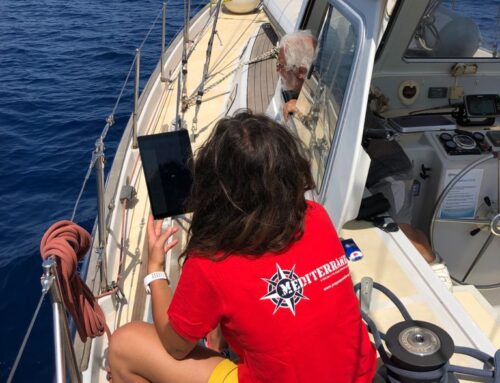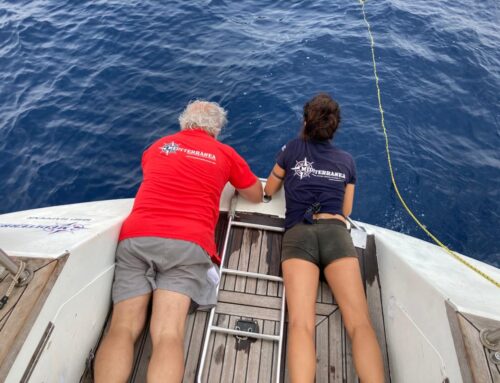(by Simone Perotti)
And then there are the islands. Thousands of Greek islands on which the recession has had little, if any effect. Perhaps due to tourism, flesh coloured gold, perhaps because on the islands there is a different mentality, the history of the people is different. I speak of this with Fabrizio Manili, an Italian who writes children’s stories on demand (the new jobs and potential of the digital era) but other books as well, like his “Leros con l’apostrofo – racconti dell’isola”, a collection of stores based on the time spent on the beautiful island of the Eastern Aegean.
“This is a strange island, it was twice a lager of dictatorship, it is the home of the biggest Greek psychiatric hospital, but also an island port for yachtsmen and those who love the sea, and who have always loved this island because it is not highly exploited from a touristic point of view and because of its hundreds of bays which provide shelter from the wind”. It seems that there is a small community of Italian on Leros, many of them are yachtsmen, some even came here and sold their boat, while others like Fabrizio, go back and forth from Italy. “I married a Greek girl, then one day it turned out that she had a family home on the island, and since then we have spent thirty years going back and forth from Rome, it is impossible to stay away too long from a Greek island like that one”.
Relations between the Italians and the island are good, and sometimes even dialectic. The Italian club which was once the “Friends of Leros” is now called the “Italian-Hellenic Club of Leros”. It is quite a large club with more than 200 members, who are not only Italian or Greek but even French and English. The committee of the Athens Dante Aligheri Society (La Dante) organises Italian courses as well as modern Greek lessons for foreigners and cultural activities.
I ask Fabrizio why the recession has had less impact on the archipelago. “On Leros, as elsewhere, the intoxication of violent economic development after the Military Junta did not actually take place. If you don’t get drunk in the first place, you don’t have a hangover afterwards. That is why we cannot now speak of negative growth”. Interesting, tell me more. “Here time has always set the place for the days and seasons. The slow time of the islands, marked by ferries, that are often late and sometimes do not arrive at all, and in the meantime you have no other choice but to wait. Or the dead times, in the middle of the day, when it is so hot that doing anything is impossible. The keywords of the island are “metà” (later) and “avrio” (tomorrow), so you see, with an approach of this kind no one has ever had the urge to speed up. I, myself, when I land in Athens, do not catch a flight for Leros, but travel by boat. I need to get here slowly, to get back into the mentality of the island, gradually. I need the time to detox from a certain idea of time … But it’s not enough”.
Fabrizio Manili talks to me of another interesting aspect of the islands, a pivotal and even symbolic area for the Mediterranean. The absence, or at least the temporary lack of things. “I built a sundial with an old shutter. I marked in pauses instead of the hours. Time is marked by pauses between commitments, and not by commitments between pauses. And also by the lack of things. On the islands something is always missing, that may be coming from Athens on the ferry, or maybe not. In the meantime you’ve got to make do, re-use a shutter, keep something instead of throwing it away, change the use of objects that can be used for something else, even when they become obsolete. The Mediterranean of the islands is recycling, re-use, inventiveness, artisanship, using your imagination to find solutions, adapt parts, do without the things you do not have. Do you see what I mean?! Things that for many are a tragic necessity to face the recession, here have always normality. The islands of the Mediterranean are ontologically and anthropologically the most suitable place to face the recession, because people who live here are used to facing a crisis, so that for them very little has changed”.
The islands as permanent culture of the recession, interesting indeed. “The elderly people tell us that things were the same in Alessandria, or Istanbul, before the mass exodus. Greeks are people who have always had to find non-conventional solutions”.
Perhaps Greeks are also people who do not have many needs, and who have never allowed themselves to be taken for a ride by fashions? “In part that is true. Let’s say that the general intoxication, the illusion of the 80s and the years that followed, of a rich Greece that could do anything thanks to Europe, and thus the madness of growth, did not last very long. There was not enough time to sweep away the previous thousand years of culture, the culture of a serious Greece, which did things in small steps, and had small expectations, daily simple joys, the cult of time, the sea and the islands, and a minimal lifestyle. The guidelines of life in Greece have always been time, the heat and the sea. When the recession did arrive, all this was still a living memory. Everyone had a father, a grandfather who remembered. When culture comes to the rescue of the dominant culture, which is undermined, the population is not alone, it does not fall into the abyss”.
No man is an island, as the saying goes. Perhaps though the islands are full of men. And wisdom. A mental note for the journey of the Mediterranea: when we reach the tens and hundreds of islands we are sailing to, what we must try to do is find contemplation, equilibrium and hope.






Leave A Comment